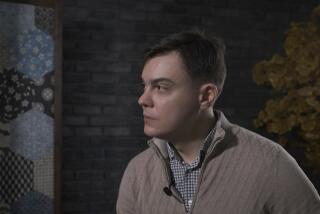Kremlin Liberal Defends Reform Drive : Yakovlev Rejects Conservative Warning of Threat to Socialism
- Share via
MOSCOW — Alexander N. Yakovlev, the leading liberal in the Soviet Communist Party’s ruling Politburo, on Saturday vigorously defended the country’s political and economic reforms from conservative criticism that the reforms, if pushed too far, endanger the country’s socialist system.
Yakovlev’s remarks were an almost point-by-point rebuttal to criticism by Yegor K. Ligachev, the party’s chief ideologist, in one of the clearest divisions in the Soviet leadership in recent months.
In the still sharp debate on how the reforms will be implemented, how far they should go and what their ideological basis should be, Yakovlev, a party secretary, urged bolder actions that would define the reforms through implementation.
Dismissing the “worry and panic” over the reforms as the result simply of unaccustomed change in Soviet society, Yakovlev said in a speech published Saturday in the party newspaper Pravda that the reforms must be intensified, broadened and accelerated.
Closest Associate
Yakovlev, 64, probably General Secretary Mikhail S. Gorbachev’s closest associate in the Soviet leadership and the philosophical architect of much of the reform, said the country should be looking pragmatically to results rather than a predetermined ideology as a guide for perestroika, or restructuring, as Gorbachev calls his reforms.
“Essentially, we have only touched the barest transformation,” Yakovlev said. “We have only tried it on for size.”
And those who believe everything is going well with reform are guilty of “destructive self-deception,” he added, attacking conservatives who argue that the current scope and pace of the country’s reforms are sufficient.
Speaking to party activists in the Lithuanian capital of Vilnius on Friday and earlier last week to a similar meeting in Riga, the Latvian capital, Yakovlev rebutted the assertions made 10 days ago by Ligachev.
Ligachev had opposed the broad introduction of market forces into the Soviet economy, had insisted on the “class basis” of Soviet foreign policy and, generally, had urged the utmost caution in breaking with past Soviet practices.
Concern Over Party Control
The 67-year-old veteran party official, speaking in the industrial center of Gorky, seemed particularly concerned by the party’s diminished control of day-to-day management of the government and economy, although this is a key element in the next phase of the reforms.
“The sources of resistance to perestroika are far clearer now than even a year or two ago,” Yakovlev replied in Riga. “The resistance has deep and complex roots in the very areas subject to the restructuring--in our country’s social relations, in the economic and social infrastructure and in the political and legal basis of society.”
With Gorbachev absent from the Kremlin on his annual summer vacation, his top subordinates are engaged in a wide-ranging ideological debate, much of it broadcast on national television and printed in Pravda, over the character and course of perestroika.
The sharp contrast in their views demonstrates to many Soviet political observers the still unsettled character of the reform program and the pivotal importance of Gorbachev’s personal decisions.
To others, however, the debate is a significant step in the country’s political development, a deliberate effort to introduce discussion of fundamental issues with divergent views from which a consensus must emerge.
Yakovlev and Ligachev have appeared at odds frequently in recent months, with Ligachev taking a notably more conservative approach to domestic problems.
While Ligachev upheld the strict socialist nature of the Soviet economy, Yakovlev last week argued for such changes as limited private enterprise and the leasing of state-owned assets, ranging from farms to factories to stores, to individuals, families and groups of workers willing to run them on a profit-or-loss basis.
Yakovlev contended, as well, that greater reliance on market forces within the economy would not only increase its efficiency but help develop democracy as well. Ligachev had warned that market forces would bring the ills of capitalism, including unemployment, to the Soviet Union.
While Ligachev stressed the need for party unity, Yakovlev praised political pluralism, particularly the non-party political organizations, which have grown to more than 5,000 in the past three years, noting that nearly all support perestroika.
Ligachev had warned against the dangers of strikes, which have been multiplying in recent months, and emphasized the need for social stability, but Yakovlev contended that such stresses were the almost inevitable result of change.
Stress on ‘Class Character’
And Ligachev, speaking to party activists in Gorky, emphasized the “class character” of international relations, reviving an element of former Soviet dogma largely discarded under Gorbachev. Any other approach “just sows confusion among Soviet people and among our friends abroad,” he said.
Yakovlev, a former Soviet ambassador to Canada, said that the “common human interest” of West and East in preventing nuclear war outweighs class concerns. Socialism’s battle against class exploitation and the quest for peace “are not opposed, but complementary,” he said.
“Marxism as such is the understanding of common human interests from the viewpoint of history and the perspective of the development of all humanity, and not just certain of its countries and classes, peoples and social groups,” Yakovlev said.
“In our times, when mankind’s interests are not in abstract categories, . . . when the whole history of mankind can be halted by the touch of a button, when any world event becomes the property of all 5 billion people, our common human interests acquire flesh and blood,” he added.
Ligachev’s comments had been viewed as a public challenge to Eduard A. Shevardnadze, the Soviet foreign minister and another close Gorbachev associate, who had just told Soviet diplomats and foreign policy experts that the struggle against capitalism was subordinate to peaceful coexistence.
More Soviet Jews are seeking to emigrate. Page 16.
More to Read
Sign up for Essential California
The most important California stories and recommendations in your inbox every morning.
You may occasionally receive promotional content from the Los Angeles Times.













